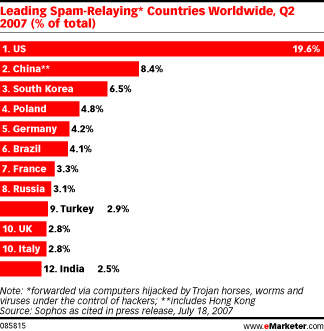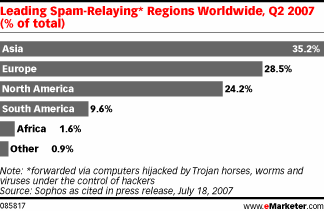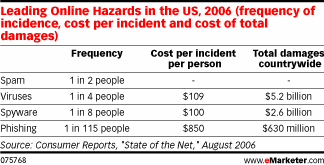Overall global spam volume grew about 9% in the second quarter of 2007 over the same period in 2006.
More nations are now contributing to the problem of spam-relaying, and the UK is back among the top spam-relaying countries in the world after having dropped out of the top 10 in 2006.

The number of Asian nations relaying spam meant that Asia was the biggest spam-relaying continent during Q2 2007. Europe has reduced its spam-relaying percentage, but Asia, North America, South America and Africa all grew in the amount of spam they sent along.

Measuring spam, viruses, spyware and phishing, the consumer watchdog Consumer Reports estimated that Americans spent at least $7.8 billion for computer repairs, parts and replacement over the past two years as a result of viruses and spyware alone.

Add in the cost of phishing scams and lost productivity dealing with spam, and the figure is probably double. (And this does not factor in the cost to businesses in dealing with these problems.)
While e-mail was the primary vehicle for spreading viruses and other malicious software (malware) in the past, spam filters have done much to reduce this threat.
Still, eMarketer Senior Analyst Ben Macklin noted the ongoing link between spam, privacy and e-commerce, since spam still infects some PCs with malware used in identity theft.
"Internet users have a reasonable expectation that governments and businesses will adequately protect their personal information from unauthorized access," Mr. Macklin said.
"Online consumers are prepared to forgo elements of their privacy to reap the benefits of participating in the online world, but if the costs begin to outweigh the benefits, consumers will opt out."





